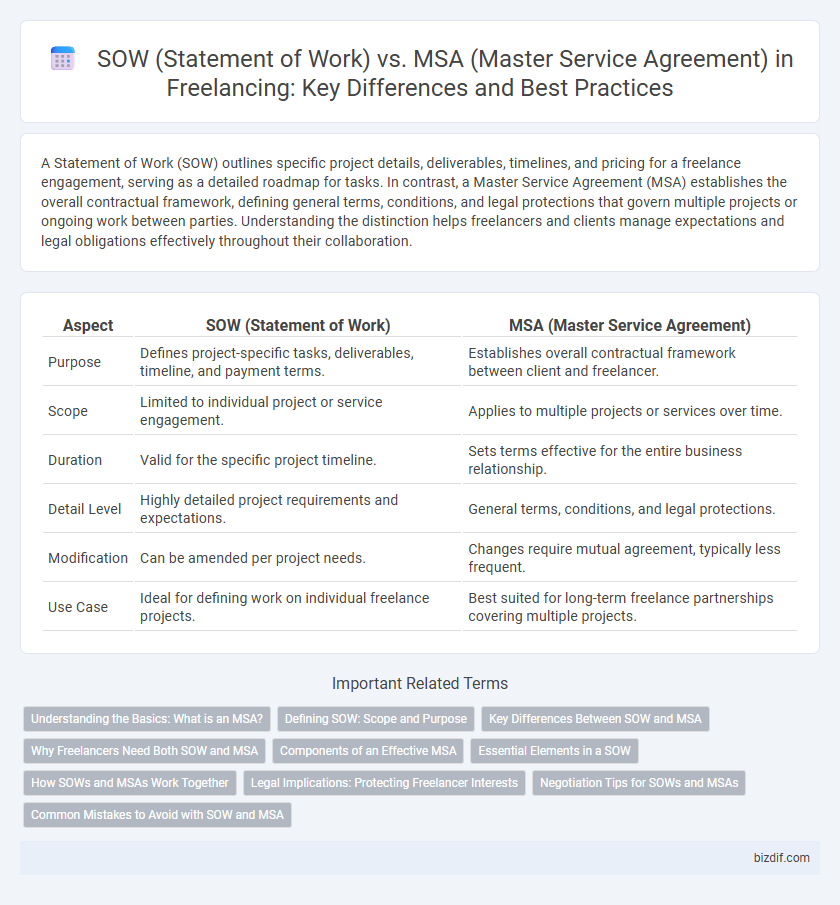A Statement of Work (SOW) outlines specific project details, deliverables, timelines, and pricing for a freelance engagement, serving as a detailed roadmap for tasks. In contrast, a Master Service Agreement (MSA) establishes the overall contractual framework, defining general terms, conditions, and legal protections that govern multiple projects or ongoing work between parties. Understanding the distinction helps freelancers and clients manage expectations and legal obligations effectively throughout their collaboration.
Table of Comparison
| Aspect | SOW (Statement of Work) | MSA (Master Service Agreement) |
|---|---|---|
| Purpose | Defines project-specific tasks, deliverables, timeline, and payment terms. | Establishes overall contractual framework between client and freelancer. |
| Scope | Limited to individual project or service engagement. | Applies to multiple projects or services over time. |
| Duration | Valid for the specific project timeline. | Sets terms effective for the entire business relationship. |
| Detail Level | Highly detailed project requirements and expectations. | General terms, conditions, and legal protections. |
| Modification | Can be amended per project needs. | Changes require mutual agreement, typically less frequent. |
| Use Case | Ideal for defining work on individual freelance projects. | Best suited for long-term freelance partnerships covering multiple projects. |
Understanding the Basics: What is an MSA?
An MSA (Master Service Agreement) is a comprehensive contract that outlines the general terms and conditions between a freelancer and a client, streamlining multiple projects under a unified legal framework. It establishes key obligations, payment terms, confidentiality, intellectual property rights, and dispute resolution methods, reducing the need to renegotiate these points for each new task. Understanding an MSA ensures freelancers can efficiently manage long-term relationships while focusing on delivering work scoped in individual SOWs (Statements of Work).
Defining SOW: Scope and Purpose
The Statement of Work (SOW) clearly defines the project scope, deliverables, timelines, and specific responsibilities for freelancing engagements. It serves as a detailed blueprint that outlines the expectations and objectives to avoid scope creep and ensure mutual understanding. The SOW complements the Master Service Agreement (MSA) by providing precise work details while the MSA governs the overall contractual relationship.
Key Differences Between SOW and MSA
The primary difference between a Statement of Work (SOW) and a Master Service Agreement (MSA) lies in their scope and purpose within freelancing contracts. An MSA establishes the overarching terms and conditions governing the relationship between the freelancer and client, covering general obligations, payment terms, intellectual property rights, and dispute resolution. In contrast, an SOW provides detailed, project-specific information such as deliverables, timelines, milestones, and pricing, serving as a scope definition under the umbrella of the MSA.
Why Freelancers Need Both SOW and MSA
Freelancers need both a Statement of Work (SOW) and a Master Service Agreement (MSA) to clearly define project-specific deliverables, timelines, and payment terms while ensuring overall contractual protections and governance across multiple engagements. The MSA establishes foundational legal terms and conditions that apply to all work, minimizing negotiation time, whereas the SOW details the scope, objectives, and milestones for each individual project. Combining both documents reduces risks, enhances scope clarity, and streamlines client-freelancer relationships for efficient and secure freelancing operations.
Components of an Effective MSA
An effective Master Service Agreement (MSA) clearly defines project scope, payment terms, confidentiality clauses, intellectual property rights, and dispute resolution mechanisms, ensuring smooth collaboration between freelancers and clients. Unlike a Statement of Work (SOW), which outlines specific deliverables and timelines for a single project, the MSA establishes overarching legal and operational guidelines applicable to multiple engagements. Precise definitions of responsibilities, service levels, and termination conditions within the MSA protect both parties and streamline contract management.
Essential Elements in a SOW
A Statement of Work (SOW) in freelancing defines project-specific details such as scope, deliverables, timeline, and payment terms, ensuring clear expectations between client and freelancer. Essential elements include objectives, detailed task descriptions, milestones, deadlines, acceptance criteria, and roles and responsibilities. Unlike a Master Service Agreement (MSA), which outlines overarching terms and conditions, the SOW focuses on the precise execution of the individual project.
How SOWs and MSAs Work Together
SOWs (Statements of Work) and MSAs (Master Service Agreements) function synergistically in freelancing by delineating detailed project tasks and overarching contractual terms, respectively. The MSA establishes general legal frameworks such as payment terms, confidentiality, and dispute resolution, while the SOW specifies the project scope, deliverables, timelines, and milestones under that framework. This dual structure streamlines workflows and risk management by separating high-level agreement conditions from project-specific obligations, ensuring clarity and efficiency throughout the freelance engagement.
Legal Implications: Protecting Freelancer Interests
A Statement of Work (SOW) defines specific project deliverables, timelines, and payment terms, serving as a detailed scope under a Master Service Agreement (MSA), which outlines overall legal terms and conditions governing the freelancer-client relationship. The MSA establishes fundamental protections such as intellectual property rights, confidentiality obligations, and dispute resolution mechanisms critical for safeguarding freelancer interests. Clear differentiation between the SOW and MSA ensures enforceability and reduces legal risks by specifying both project details and overarching contractual protections.
Negotiation Tips for SOWs and MSAs
Negotiating SOWs (Statement of Work) requires clear scope definitions, deliverables, timelines, and payment terms to prevent scope creep and ensure mutual understanding between freelancer and client. In MSA (Master Service Agreement) negotiations, focus on liability clauses, intellectual property rights, confidentiality, and termination conditions to establish a solid legal framework for multiple projects. Prioritizing transparency and detailed documentation in both SOW and MSA negotiations mitigates risks and fosters long-term professional relationships.
Common Mistakes to Avoid with SOW and MSA
Common mistakes in SOW and MSA include vague scope definitions, leading to scope creep and payment disputes. Overlooking detailed timelines and deliverables in the SOW can cause project delays and misunderstandings. Failing to align MSA terms with SOW specifics results in conflicts over liability, termination clauses, and intellectual property rights.
SOW (Statement of Work) vs MSA (Master Service Agreement) Infographic

 bizdif.com
bizdif.com